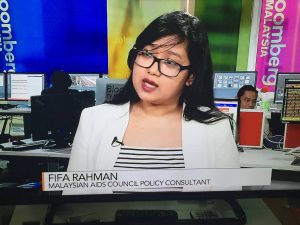 [Fifa Rahman for IP-Watch, Link (CC-BY-SA)] Gilead’s announcement today that they would include four middle-income countries (Malaysia, Thailand, Belarus, Ukraine) in their sofosbuvir voluntary licence was a welcome surprise, and will enable millions access to their highly effective, but exorbitantly priced, drug.
[Fifa Rahman for IP-Watch, Link (CC-BY-SA)] Gilead’s announcement today that they would include four middle-income countries (Malaysia, Thailand, Belarus, Ukraine) in their sofosbuvir voluntary licence was a welcome surprise, and will enable millions access to their highly effective, but exorbitantly priced, drug.
The decision to include these countries, however, no doubt is a response to increasing pressure from within these countries to either issue a compulsory licence (CL) or a government use licence (GUL), invalidate the sofosbuvir patents, or block data exclusivity for the drug.
The threat of a GUL in Malaysia may have been particularly instrumental. Sources state that the Malaysian Cabinet has only recently given approval for the GUL application, and Gilead may have decided to circumvent this, in the nick of time, to prevent the possible mushrooming of other GULs/CLs in neighbouring countries or countries in the same income bracket who were excluded from the Gilead voluntary licence.
The issuance of a GUL, which enables a patent to be overridden, and the generic version to be manufactured or imported for use in government facilities, is a completely legal mechanism provided for in the TRIPS agreement. Unfortunately, they have not been used as extensively as they should be due to fears that they result in trade retaliation, a myth that is quite easily disproven.
In Malaysia, the Ministry of Health began price negotiations with Gilead in 2016. Price negotiations with the patent holder are not required for GULs, but in practice, they often occur. The news emerged around this time that Gilead was unwilling to go below $12,000 for a complete course of 12-weeks treatment. Given that average Malaysian household incomes are a little over $1200 per month, and HCV affected populations often earn much less than this, there was no way that the proposed price would be an acceptable price point.
In the meantime, in my capacity as Manager – HCV Access & Affordability for the Malaysian AIDS Council, and in partnership with Third World Network and MTAAG+, I met with the Pharmacy Practice & Development Department, Ministry of Health on 17 August 2016 to enlist our support, lobby for the GUL or CL, and provide data on Brazilian, Ukrainian, and Chinese progress on TRIPS flexibilities to access sofosbuvir. Earlier that month, we had met with Gilead’s representative in Malaysia to discuss their proposal to the MOH.
We then planned for a bipartisan parliamentary roundtable discussion on the use of GULs/CLs for access to medicines. On the 24th of November 2016, this roundtable discussion was held in the Parliament building, and was chaired by the Deputy Minister of Health, Dato’ Seri Hilmi Yahya. The MOH pharmaceutical pricing negotiating team attended this meeting, and it was then that we learned that procedures for a GUL were underway and were at that time with the Ministry of Domestic Trade for their further action.
Meanwhile, in the fourth quarter of 2016, Drugs for Neglected Diseases initiative (DNDi) had begun a feasibility trial with generic sofosbuvir and ravidasvir as a pan-genotypic regimen in Malaysia, with the objective of demonstrating that a public health approach in resource-limited settings was possible. There is no doubt that as anecdotal results emerged from this, there was increasing pressure on Gilead to respond with a price reduction.
In the first quarter of 2017, the Cabinet paper for the government use licence was tabled, and as aforementioned, this was only recently approved. Gilead’s response, as aforementioned, was the inclusion of Malaysia in their voluntary licence.
Countries have been loath to issue GULs or CLs because of perceived trade repercussions that might occur after a GUL/CL is issued, and this concern circulated because of the US withdrawal of Generalised System of Preferences (GSP) status for 2 Thai products in the year following the issuance of compulsory licences in Thailand for HIV and cancer drugs. Less publicised is the fact that in the same year, the US granted GSP status for 8 more products.
Fear of American trade sanctions post-GULs/CLs is also unjustified given that the US themselves considered using a CL to respond to anthrax scares in 2001, and more recently in 2017 in Louisiana, where patients were unable to access HCV direct-acting antivirals due to the high price point. Furthermore, in a 5 August 2016 letter to DC-based non-profit Knowledge Ecology International, the US Department of State stated that they ‘respect(s) our trading partners’ rights to protect public health and, in particular, to promote access to medicines for all… The TRIPS Agreement affords countries sufficient flexibility to address serious public health challenges, including the right to issue compulsory licenses for pharmaceuticals in cases that meet all of the elements of Article 31 of TRIPS.’
Therefore, not only are fears of trade retaliation post-CLs unfounded, but the Malaysian actions also demonstrate that even the threat of a compulsory license can result in the patent-holder voluntarily including countries’ in existing licences, resulting in reduced prices and increased access to medicines for all.
Fifa Rahman is a Postgraduate Researcher in Intellectual Property Law, International Trade, and Access to Medicines, University of Leeds.
References
Johnson, C. Y. 2017. Louisiana considers radical step to counter high drug prices. The Washington Post. [Online]. [Accessed 7 July 2017]. Available from: https://www.washingtonpost.com/business/economy/louisiana-considers-radical-step-to-counter-high-drug-prices-federal-intervention/2017/07/03/456b99f6-4a59-11e7-a186-60c031eab644_story.html?utm_term=.00bb41886e67
Mullin, T. F. 2002-2003. AIDS, anthrax, and compulsory licensing: has the United States learned anything? A comment on recent decisions on the international intellectual property rights of pharmaceutical patents. ILSA Journal of International & Comparative Law. pp. 185-209
Rahman, F., Chee, Y. L. 2017. Intellectual property and HCV: barriers and solutions. In: Rahman, F. (ed). 2017. At the edge of a miracle: the hepatitis C virus (HCV) in Malaysia. Kuala Lumpur: Malaysian AIDS Council




